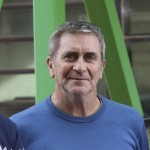ANZAAS Science Talk, Melbourne
All welcome, free, tell your friends! Free refreshments after the talk
Wednesday 19th November 2025, 6:30 pm
At Bio21 Institute, 30 Flemington Rd, near corner with Park Drive, Parkville
Professor Michael Foley
La Trobe University
“Human therapies inspired by sharks”
 Monoclonal antibodies have become an important class of therapies for a wide range of human conditions. Recently an unusual new class of antibody like proteins from sharks and camelids (Llamas and Alpacas) have made their way into the clinic. These antibody-like molecules are unusual in that they are very small (less than 1/10th the size of a human antibody) and they are extremely stable and easier to manufacture. Several groups are exploring these peculiar molecules not only as important biochemical tools but also as therapies for diseases ranging from cancer to fibrosis. Over the years Micks lab has developed a “humanized” version of the shark antibody (called an i-body) which will maintain the advantages of these small proteins but will avoid being seen as foreign when administered to humans as therapy.
Monoclonal antibodies have become an important class of therapies for a wide range of human conditions. Recently an unusual new class of antibody like proteins from sharks and camelids (Llamas and Alpacas) have made their way into the clinic. These antibody-like molecules are unusual in that they are very small (less than 1/10th the size of a human antibody) and they are extremely stable and easier to manufacture. Several groups are exploring these peculiar molecules not only as important biochemical tools but also as therapies for diseases ranging from cancer to fibrosis. Over the years Micks lab has developed a “humanized” version of the shark antibody (called an i-body) which will maintain the advantages of these small proteins but will avoid being seen as foreign when administered to humans as therapy.
Mick completed his PhD in biochemistry at the University of Dundee in Scotland and was awarded a Wellcome Training Fellowship to work with Robin Anders in the Parasitology group at the Walter and Eliza Hall Institute. In 1995 Mick joined the Department of Biochemistry at La Trobe University where he has been using phage display of antibodies and peptide technology as a means of answering fundamental questions of immunity to infectious diseases. Mick has been involved in several Cooperative Research Centers over the years and is the founding scientist of AdAlta and a key inventor of AdAlta’s lead i-body candidate AD-214 as a therapy against pulmonary fibrosis. AD-214 has recently completed safety trials in humans and several other i-bodies are being advanced. The latest i-body to be developed is against malaria.
—————
We are pleased to acknowledge the support by CSL and Bio21 for the ANZAAS Melbourne science talks series
Further Info: David Vaux davidlaurencevaux@gmail.com
http://www.anzaas.org.au/victoria/
___________
Click HERE to see past ANZAAS Science Talks
Michael Foley November 2025
Human therapies inspired by sharks
Ros Gleadow October 2025
The poisonous plate of climate change
David Mitchell September 2025
Cosmic Rays – Celestial Bullets
Christopher Fairley August 2025
Whose fault is it that Bob got syphilis?
Anette “Peko” Hosoi July 2025
Form, Function and Physics: How Fluid Mechanics Shapes Life
Ricky Johnstone June 2025
Are we really ready for research-driven personalised cancer care in Australia?
John Long May 2025
Secret Life of Sharks – Lessons in Evolution and Survival
Peter van Wijngaarden March 2025
Imaging the eye to see the brain
Tony Heyes November 2024
Disability, Innovation and Spin-offs
David Vaux August 2024
Cell death: Bench to Bedside
Peter Cowan July 2024
Xenotransplantation: Custom-Designing Pig Parts for People
Richard Olive May 2024
The West Gate Bridge Disaster – A Failure at the Engineering, Organisational and Personal Levels
Greg Moore November April 2024
Urban trees are vital for sustainable, liveable cities
Rachelle Buchbinder March 2024
Hippocrasy, how doctors are betraying their oath
Daniel Mathews November 2023
Topology and the shape of space
Beth Ebert October 2023
Improving early warnings of epidemic thunderstorm asthma
David Komander September 2023
Playing Tag with Ubiquitin
David Vaux August 2023
A short history of cancer genes
Chris Greening May 2023
The atmosphere as a hidden energy source for life
Jim Goding March 2023
Transistors, the Microchip & the Second Industrial Revolution
Paul Lasky November 2022
A new window on the Universe
Peter Currie October 2022
Regeneration: Myths and monsters and modern medicine
Heather Mack September 2022
Injecting eyes with antibodies to treat problems of the retina
Helen Green August 2022
Dating Australia’s rock art
Mahdi Jalali July 2022
Transport electrification and integration of EVs within the electricity grid
Grant McArthur June 2022
Science led inroads into melanoma – Australia and New Zealand’s disease
Alan Duffy May 2022
Darkness visible down-under
Timothy Clark April 2022
The importance of reproducibility and integrity in science: a fishy perspective
Tilman Ruff March 2022
Ending the nuclear weapons era evidence, challenges and pathways
Brian Abbey November 2021
The colour of cancer: could ‘smart’ microscope slides transform tissue diagnostics?
Cameron Simmons October 2021
Creating stop signs in mosquitoes; is this the end-game for Dengue?
Madhu Bhaskaran September 2021
Unbreakable sensors the future is here
Anne Marie Tosolini August 2021
Fossil Leaves from Cretaceous and Paleogene Polar Environments
Geoff Brooks July 2021
Green Steel: Can we decarburise steel production?
————–

